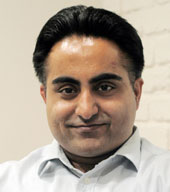 |
He loves gourmet food and adventure sports. He enjoys holidaying in exotic locations. He’s an avid reader too. That’s hardly the image one would conjure of the chairman of one of the world’s largest online marketplaces ? eBay India. But Avnish Bajaj, 34, is all this and more. He has always been a high flier.
Bajaj went to schools all over India as his father was a civil servant. As a teenager though, he dreamt of being an Indian Air Force pilot. Says Bajaj: “I took the National Defence Academy (NDA) exams and was recruited too. But my parents did not like the idea of me flying.”
So, back on the ground, he went on to complete his graduation from IIT Kanpur, and later, a masters in computer science from the University of Wisconsin in the US. His first job was with Apple Computers in 1993 where he was sent to work with its alliance partner SAP in Germany. After a two-year stint, he was back to studying management at the Harvard Business School (HBS). “I did my summer internship with McKinsey Consulting in their High Technology Group but soon realised that consultancy was too hands-off for me. So I decided to do banking.”
Between 1998 and the end of 1999, Bajaj worked for Goldman Sachs at their New York office, focussing on mergers and acquisitions, valuations and the like. He would have been a banker all his life, but fate willed otherwise. At New York he met his friend Suvir Sujan, also an alumnus of HBS. They were discussing business opportunities in Internet space when they realised that the US as a market was reaching its saturation level as good web ideas were already funded. “We then looked out of the US, and India was the first one on our radar,” Bajaj says.
The Internet was just beginning to bloom in India and, thanks to his banking experience, Bajaj realised that the Net would be a revenue driver in the years to come. As he points out: “We were sure that if we implanted a business model that had worked successfully in the West, we would have a winner on our hands.” Thus happened Baazee in March 2002.
Baazee was India’s first online marketplace where there were buyers and sellers of different products. But the success was short-lived as the dotcom bust soon followed. Bajaj recalls it as one of the toughest phases on his life. “There was, of course, investor pressure. But I did not consider it that great. Far more challenging was the perception that would be formed in the minds of consumers that it was not a sustainable industry.”
When several other websites were suspending operations, Bajaj took the opposite route. Baazee acquired another website, www.bidorbuy.com, bolstered the technology team and invested heavily in the branding of the company. He and his team also ensured that the Baazee customers were not affected in any way during the bust. As things began to revive in late 2003, the company again began turning in profits. Says Bajaj: “By 2004, it was clear that not only was the market positive but international players began looking at India as the next e-commerce destination. It was time for another strategic decision.” Rather than looking for further funds or expanding elsewhere, Baazee decided to sell itself to eBay Inc.
How did the employees react to this decision? “They were delighted,” says Bajaj. “During the dotcom boom, we had the lowest attrition rates because people worked out of passion. But how far can passion work? We have to provide employees avenues to grow and learn and eBay provided us with this.”
In 2004, Bajaj embarked on his new role as country manager of eBay India, Mumbai. When you ask him about the transition from an entrepreneur to an employee of a company, he says: “As an entrepreneur, I put the nuts and bolts in place to execute correctly. Now I am more of a visionary. I look at a forest as opposed to a tree.” He may not have any start-ups currently, but he is an active member of various industry forums with a particular focus on e-commerce and entrepreneurship.
So, has the innovator died? “I am an entrepreneur at heart. I am enjoying my current role though I know there are many opportunities in the Indian market today,” he says and leaves all of us guessing.
As told to Aparna Harish in Calcutta










